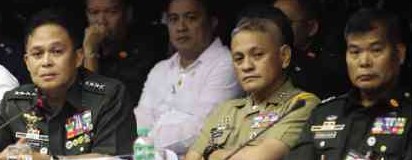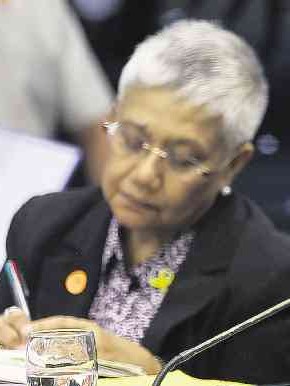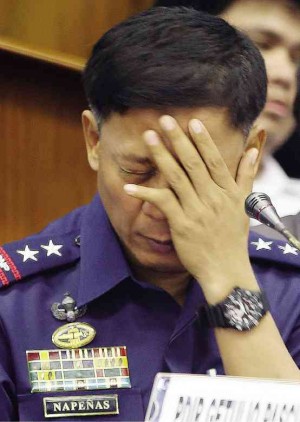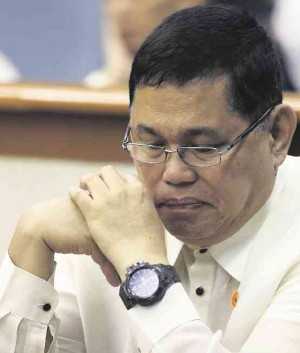AFP-PNP distrust noted
The apparent rift between the Armed Forces of the Philippines and the Philippine National Police on the Mamasapano incident was put on display on the second day of the Senate inquiry into the deadly clash between the PNP Special Action Force and members of the Moro Islamic Liberation Front (MILF), Bangsamoro Islamic Freedom Fighters (BIFF) and private armed groups.
Director Getulio Napeñas, relieved Special Action Force (SAF) commander, said he did not inform the military about the operations to capture Malaysian bomb expert Zulkifli bin Hir, alias “Marwan,” and BIFF commander Abdul Basit Usman for fear the operation would be leaked to MILF contacts within the military camps.
The military only got to know of the police mission during the actual operation or “time-on-target.”
Asked by Sen. Bam Aquino if he stood by his decision to coordinate with the AFP time-on-target, Napeñas replied in the affirmative citing past experiences.
“I stand with that your honor because that was deliberated accordingly during the preparations of the plan … that if we do coordination with the AFP prior to the operations, we will be compromised in the operations again,” he said.
Article continues after this advertisement
AFP chief Gen. Gregorio Pio Catapang, Gen. Rustico Guererro and Brig. Gen. Edmundo Pangilinan. EDWIN BACASMAS
Napeñas said the time-on-target move was adopted in November because of what happened last April when an operation was botched. In that operation, the PNP had coordinated with the 6th Infantry Division, which withdrew a commitment to provide mechanized brigade units to support the operation.
Article continues after this advertisementThe first message the military got from the PNP in the Jan. 25 operation targeting two terrorists in Mamasapano, Maguindanao province, was merely to inform the former of the PNP operations, not to coordinate with it.
And by the time, the PNP sought assistance from the military, they were already under heavy fire from Moro rebels.
And so declared on Tuesday Armed Forces Chief of Staff Gen. Gregorio Pio Catapang and military ground commanders in the Mamasapano incident, in further highlighting the apparent last-minute role the military played in the operation to capture two known terrorists that ended with the slaughter of 44 police commandos.
Lack of coordination
On Tuesday, senators sought answers on why there was a lack of proper coordination between the AFP and the PNP given that the targets were high-value ones and that the government was observing a ceasefire with the MILF.
At the hearing, Napeñas said the military was provided “early in the day with grid positions’’ of the SAF members as well as enemy positions.
Napeñas said coordination between the AFP and PNP in the operation was included in the “mission planning’’ that started in November last year.
“These are continuing operations against Marwan and Usman,’’ he said.
Not call for assistance
But Major Gen. Edmundo Pangilinan, commander of the 6th Infantry Division, said that the military had insufficient data on the police operation that included the location of friendly forces.
“We didn’t have that picture when everything was happening and it’s very difficult to imagine what the area of operation is,’’ Pangilinan said.
Catapang said when the SAF first texted the AFP it was not about coordinating with them.
Info texted
“They texted information that they are entering the area. There was no instruction to provide assistance … When they asked for assistance, they were already under fire,’’ said Catapang. He noted that he was then in Zamboanga province with President Aquino to look into the recent bombing there.
Catapang said he got a text from Purisima at 5:51 a.m. on the police operation and he relayed this to Lt. Gen. Rustico Guerrero, the chief of the AFP Western Mindanao Command.
This was echoed by Pangilinan who said the first text that the 6th Infantry Division got from SAF was at 6:18 a.m. of Jan. 25 and that the police commandos informed the division that they were in an encounter. He said the text was “not a call for assistance.’’
He said the text provided though the grid coordinates of the SAF commanders’ location.
3 recommendations
At 7:28 a.m., Pangilinan said the brigade commander texted and gave three recommendations on what they would do. The third recommendation was put on hold as it called for artillery support for the policemen.

HE SAID, THEY SAID Heard at the Senate hearing on Tuesday (from left): CIDG chief Benjamin Magalong, PNP OIC Leonardo Espina, Interior Secretary Mar Roxas, Defense Secretary Voltaire Gazmin and Justice Secretary Leila de Lima. EDWIN BACASMAS
Guerrero said artillery support was not given because the military had no complete picture of the situation.
Pangilinan said the military was asked to ready its troops, who reached the area at 9:20 a.m.
On questioning by Sen. Ralph Recto, Pangilinan denied that the military did not help the police, saying that ground commanders were coordinating with their smallest unit “based on pieces of information coming out.’’
Recto said he was not blaming the military but he noted that the time-on-target principle was nothing new.
But Pangilinan said there was no time-on-target coordination in the military and that this was a term used by the Philippine Air Force.
‘Fire on my location’
Interior Secretary Mar Roxas said that even if the PNP had not coordinated with the AFP, the police commandos had already sent a call for help, an “SOS.”
Roxas said he was aware that there were protocols that had to be followed about releasing artillery and the like. But he said there was also the concept of “fire on my location.”
He said the besieged SAF men were surrounded by enemies and were likely to be decimated.
He believes police commandos would have taken the chance of the soldiers firing on their position, because at least, there was a chance they would not be hit, and their enemies would be hit instead.
Anyway, if the soldiers would not fire on their location, their enemies would still pick them off one by one.
But he clarified that there was no specific request for this.
Following the military’s assertion that it did respond properly even if the call for help came very late, Deputy Director General Leonardo Espina, the PNP officer in charge, dispelled perceptions that the police and military were at odds.
Espina said that if ever there was a misunderstanding between the two forces it was “limited’’ to the Mamasapano incident.
“Honestly, the relationship of the whole AFP and the PNP is very vibrant, very close… There might be misunderstanding on the ground… No rift. Maybe there’s just misunderstanding on this particular occasion,’’ Espina said.
Even if the AFP and PNP may be at odds over the incident, they were in agreement that the MILF and BIFF were coddling Marwan and Usman. They also agreed that the MILF and BIFF were the ones who engaged the SAF troops in the deadly clash.
Infighting for glory or bragging rights between the police and military was common, a former Marine captain-turned-lawmaker yesterday said.
“I have experienced that wherein one unit would not share information with the other unit because they wanted to accomplish the mission by themselves. That is not good for the service,” Magdalo Rep. Gary Alejano said at the weekly Ugnayan sa Batasan forum.
The Senate probe of the Mamasapano incident has shown the apparent lack of trust between the PNP-SAF that was on a mission to arrest Marwan and the AFP, which was supposed to provide support for the trapped commandos.
Alejano cited the previous attempt to neutralize Marwan. It failed because the AFP refused to provide support to the SAF.
He said SAF’s bad feelings were compounded when the AFP launched its own Marwan mission two weeks later using the intelligence gathered by the police commandos. “You can really see there is competition.”
Alejano said that the friction was evident not only between the police and the military but between the units of the military.
“You have the Navy, you have the Air Force, you have the Marines, and I think that is where the personal interest of some commanders come in,” he said.
The Magdalo lawmaker suggested that the country’s defense and security forces adopt a “holistic” approach in carrying out their mission where no commander would get all the fame or the blame.
He said the government would save more lives in the field if no member or unit was kept in the dark about the mission details and objectives.
Alejano said that he had proposed that the colonels not be included in the positions covered by the Commission on Appointment (CA).
“[I]t is better that we limit the CA to sensitive positions to avoid politicizing the positions and stop the need to have connections in order to climb [in the hierarchy],’’ he said.
“This is why misencounters happen. It’s a good thing that this has come out so we can finally resolve this issue.” With a report from Gil C. Cabacungan
RELATED STORIES
2 Marwan tipsters in MILF custody
RELATED VIDEOS


